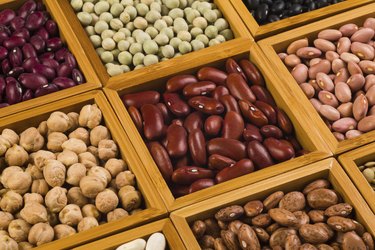
Beans are eaten around the world and are valued as an inexpensive protein source. Beans also contain many other components that make them an integral part of a healthy diet. Plant estrogens found in beans are being studied by many researchers to determine their benefits and possible risks.
Estrogen
Video of the Day
Estrogen is a steroid hormone present in humans and animals. Its purpose is to regulate reproductive cycles and influence growth and development. While both men and women produce estrogen, it is much more plentiful and influential in females. A report from Tulane University explains that estrogen levels surge during adolescence, then vary throughout the month with the menstrual cycle. Levels drop off at menopause. Women may use estrogen replacement therapy to ease menopause symptoms; however, too much estrogen is linked to cancer.
Video of the Day
What are Plant Estrogens
While estrogen naturally occurs in humans and animals, plant estrogens are found in certain foods. Beans, grains and seeds all contain plant estrogens, also called phytoestrogens, which are very similar to estrogen. Cornell University explains that at low doses, plant estrogens act the same as estrogen. But at high doses, phytoestrogens can block estrogen or limit its level in the bloodstream. They can change cells' communication pathways and cause alterations in cell multiplication. Studies are still unclear about whether this will work to your advantage in fighting diseases like cancer.
Beans High in Plant Estrogen
Plant estrogens are found in more than 300 foods, and can be divided into three different chemical classes: isoflavonoids, lignans and coumestans. Legumes, particularly soybeans, contain isoflavonoids. Lignan phytoestrogens are concentrated in beans, cereals and flaxseeds. Split peas, clover, alfalfa sprouts and pinto beans are high in coumestans. Cornell University's Program on Breast Cancer and Environmental Risk Factors website says that while moderate consumption of these foods is generally considered healthful, taking concentrated phytoestrogen supplements might increase your breast cancer risk.
Effects of Estrogen
Beans, especially soy, have been investigated for health-related risks and benefits, with inconclusive results. Researchers have delved into soy's effects on weight loss, arthritis, brain function and the unpleasant side effects of menopause. Soy seems to be a safe alternative for most infants who lack access to cow's milk. Researchers from the University of California, published in the January 2012 issue of the "International Journal of Alzheimer's Disease," have determined that estrogen may decrease your risk of Parkinson's disease.
Soy Phytoestrogen and Breast Cancer
Research on the interactions between soy phytoestrogens and breast cancer has been especially intense, and disappointingly inconclusive. Some scientists are hopeful that soy beans can reduce the incidence of cancer; others suspect it of increasing risk. According to Cornell University, the studies have had several problems, including too-small sample sizes and lack of racial diversity. While many studies have focused on the effects of soy on Asian women, other populations may experience different results.
- Cornell University; Program on Breast Cancer and Environmental Risk Factors; Phytoestrogens and Breast Cancer
- International Journal of Alzheimer's Disease: Hormone Replacement Therapy and Risk for Neurodegenerative Diseases
- MedlinePlus.com: Soy
- Tulane University: The Hormones: Estrogen
- American Nutrition Association: The Whole Soy Story